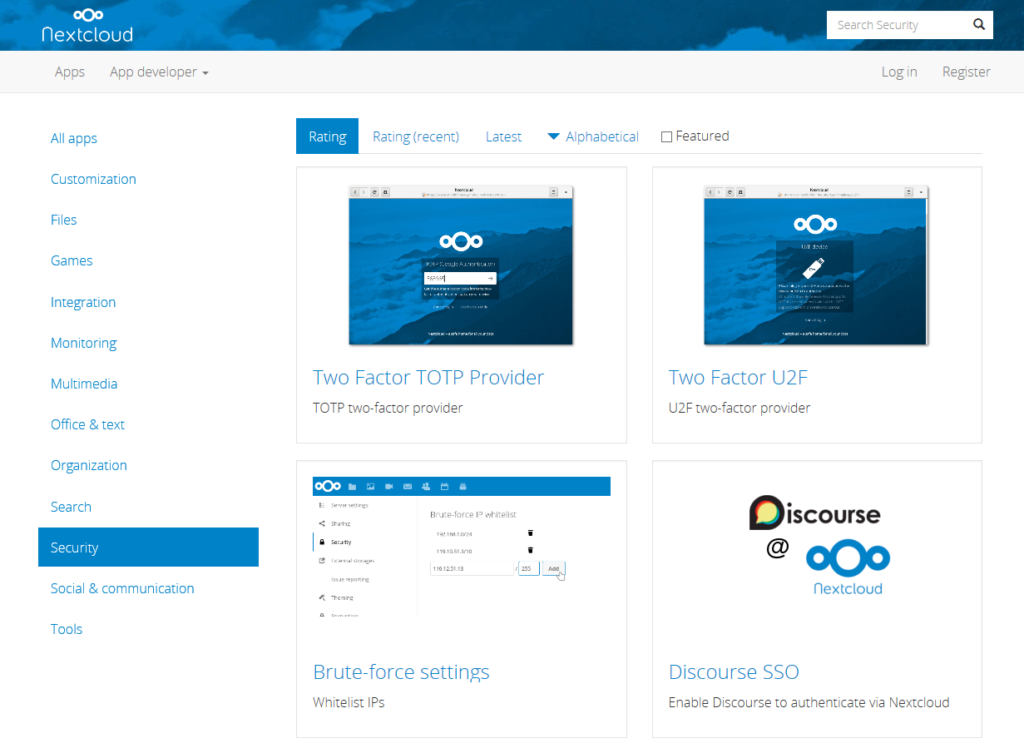


Due to limitations with Pydio's PHP-based backend, the developers decided to rewrite the backend in the Go server language with a microservices architecture. Pydio Cells, which achieved stability in May 2018, is a complete overhaul of the Pydio filesharing application's core server code. If you'd like to contribute, access its source code, report a bug, check out its (AGPLv3) license, or just learn more, visit the project's GitHub repository. NextCloud's documentation page offers thorough information for users, admins, and developers as well as links to its forums, IRC channel, and social media pages for community-based support. A marketplace offers numerous apps to extend its features. Like the other solutions on this list, NextCloud is self-hosted, but if you don't want to roll your own NextCloud server on Linux, the company partners with several providers for setup and hosting and sells servers, appliances, and support. It also encrypts data during transfer and at rest and integrates with mobile device management and authentication mechanisms (including LDAP/AD, single-sign-on, two-factor authentication, etc.). It has HIPAA (healthcare) and GDPR (privacy) compliance features and offers extensive data-policy enforcement, encryption, user management, and auditing capabilities. Nextcloud touts its high security and regulatory compliance as a distinguishing feature. NextCloud spun out of ownCloud in 2016 and shares much of the same functionality.
Dropbox alternatives local server manuals#
OwnCloud offers comprehensive documentation, including an installation guide and manuals for users, admins, and developers, and you can access its source code in its GitHub repository.

You can also expand its functionality with a wide variety of third-party apps available in its marketplace, and there is also a paid, commercially licensed enterprise edition. Data transfers are secured by end-to-end encryption (E2EE) and SSL encryption.
Dropbox alternatives local server for android#
With ownCloud, you can sync and access files through clients for Linux, MacOS, or Windows computers or mobile apps for Android and iOS devices, and provide password-protected links to others for collaboration or file upload/download. (Self-hosting is a common thread among the apps on this list.) Its primary difference (aside from its open source license) is that your files are hosted on your private Linux server or cloud, giving users complete control over your data. Its primary features-file and folding sharing, document collaboration-are similar to Dropbox's. OwnCloud, launched in 2010, is the oldest application on this list, but don't let that fool you: It's still very popular (with over 1.5 million users, according to the company) and actively maintained by a community of 1,100 contributors, with updates released regularly. From British Columbia’s FIPPA to New Brunswick’s PHIPAA (and every province and territory in between), Sync’s got your Canadian cloud storage compliance fully and completely covered. By switching to Sync, your business will meet all Canadian federal and provincial data privacy laws and data residency regulations. Sync is a truly Canadian cloud storage provider. Therefore, to protect your business, you should be storing your data in Canada whenever possible (and it’s even the law in British Columbia). When your data is stored in a foreign country, you lose sovereignty, which means there’s no protection from unauthorized access. It’s one of the reasons why Dropbox, an American company, can give themselves such easy access to your files-they don’t have to comply with Canada’s PIPEDA data privacy protection legislation. Finally, a truly Canadian Dropbox alternativeįor Canadian companies utilizing the cloud, storing client data on US soil can be risky business, as the United States does not provide any form of data privacy protection.


 0 kommentar(er)
0 kommentar(er)
